- Home
- Johnny D. Boggs
The Cane Creek Regulators Page 6
The Cane Creek Regulators Read online
Page 6
Breck Stewart set the brake, and checked his rifle. Robert Gouedy had already jumped from his wagon, his rifle cocked.
“Dogmael?” he called out. “Dogmael Jones!” No answer. The cabin’s lone door was open a crack. “Bethan? Wil!” Gouedy even tried calling to the youngest of the daughters. “Seren?”
Emily bit her lip as she looked around. The door to the chicken coop, now empty except for feathers, had been ripped from its fastenings. Horses had trampled several rows of corn.
“It is Sunday,” Stewart said as he climbed off the wagon, “and they are Welsh Baptists. They could have gone to meeting. They …” He stopped. He knew better. “Stay here, Daughter,” he said. Then, putting a slight distance between themselves, he and Gouedy began to approach the cabin, their rifles aimed at the open door.
Emily had no intention of going anywhere. She dismounted Ezekiel, and stood, her heart pounding. She found herself praying that the Jones family be at a Baptist meeting, be far, far, far from this place.
Stewart stepped onto the porch, and over the dead dog. Gouedy stood at the steps, his rifle remaining aimed at the door as Stewart pushed it open with the muzzle of his long rifle. He moved to the side, rifle at the ready, turned around, and leaned against the roughhewn logs, color draining from his face.
By that time, Gouedy had come up the steps and moved inside the cabin.
Emily heard his choked cry.
“Dear God …!”
Stepping inside, Stewart lowered his rifle, wiped the sweat from his brow, and called out to his daughter, “Do not come in, Emily! Do not come in here …” And he pulled the door shut behind him.
She moved away from the marsh tacky and toward the span of mules, trying to remember the members of the Jones family alive and happy. She had not visited since returning from her banishment to Georgetown after the Cherokee War. Her father had called Dogmael Jones a “Hard-Shell Baptist, as hard as they come,” and he had certainly seemed strict. More so, Emily thought, than the Reverend Monteith. Once, Mr. Jones had told Emily that she could never be baptized because she was not a believer.
“I believe in God,” she had snapped back. “And in Jesus.”
“You are Presbyterian,” he had countered. “Thus saith the Lord.”
Bethan Jones was a couple of years younger than Emily, quiet, hardly ever making eye contact with anyone, especially her father. Seren would be maybe ten years old now, Emily wasn’t sure. The child had said scarcely a word when Emily and her father had visited here the last time on their way back to Ninety Six. The whole visit she had clutched her older sister’s neck. Wil? He was Emily’s age, maybe a year or two older, with black hair and dark eyes that always seemed locked on Emily, until she spotted his gaze—then he would quickly turn away, smiling. Their mother had died when Seren was barely a year old. Emily had never known her.
Emily looked back at the cabin, the door still shut, but candlelight now flickering through the cracks in the window’s shutter. The sun had settled behind the tops of the pines, and although the heat was still intense, she shivered. Again, she studied the ruined rows of corn, the raided chicken coop, and then her gaze settled on the pigpen. The rails to the pen had been kicked down, and nothing seemed to be left inside but mud, straw, manure, and footprints.
It was then that a snort caught her attention, and she looked past the fields. Two hogs had survived the attack and they were nudging at the ground at the edge of the woods, grunting, pawing, eating. Suddenly snarling, the bigger one charged the other pig, and that animal—which certainly wasn’t small—disappeared, squealing, into the forest. Satisfied and alone, the hog returned to its meal.
She didn’t even realize that she had started walking toward it until she began crossing the furrows of the rows of carrots and potatoes. Stopping, she glanced at the side of the cabin. The hog snarled, and she looked back at the animal. It had stepped away from its supper, baring its teeth, trying to intimidate the intruder. Emily glanced at her hands, realizing that she held the club Mr. Gouedy always carried in the driver’s box of his wagon. She didn’t remember picking it up.
Armed with a heavy, spiked stick, she found her resolve and moved toward the pig, holding the club with both hands. The hog came toward her, but Emily didn’t retreat. By the time she had crossed the last row, she could see the linen petticoat at the side of a felled tree. Next to it was a shoe. The hog had returned to the other side of the downed timber, snorting furiously.
Which is when Emily knew what the pig was eating, what lay on the other side of the timber. Cursing, she charged, sending the big hog scurrying into the woods.
Emily stopped, looked down. The club slipped from her hands, and she spun, falling to her knees, the tears cascading down her face. Turning toward the cabin, she screamed.
Chapter Seven
They had gathered inside the Jones cabin, these men from the Welsh Neck, including Owen Devonald and Reverend Monteith.
From the loft, Emily couldn’t see them. In fact, it took a few minutes before she remembered what had happened. Then a sob caught in her throat, and she turned her head on the soft pillow that already was soaked through with tears. Seren Jones’ face came back to her, and she pulled the pillow over her face, wishing it would suffocate her.
Down below, she heard voices.
“What kind of man deflowers a child? And then …?”
“No man.” Her father’s voice. “But a beast.”
“Any sign of the older one … what was her name?”
“Bethan.” That sounded like Owen Devonald.
“No sign.”
“I fear that these vermin have taken her with them.” Again Emily recognized her father’s voice, but he sounded older and tired.
Another voice. Someone just entering the cabin. “Mister Stewart, what in heaven’s name did they do to young Wil?”
Silence.
Emily squeezed her eyes shut, shaking her head. She had prayed, but God had denied her solace. Now she knew what her father and Mr. Gouedy had found inside the cabin.
“They heated a poker in the fire,” her father finally answered, “and held it at the poor lad’s feet.”
“In the Lord Jehovah’s name … for what reason?”
A few curses followed before her father responded. “My guess would be that they were torturing young Wil so that he would reveal information about any hidden money, jewelry … anything of value.”
“Dogmael Jones had nothing of value,” Owen Devonald said. “He was poorer than William McGee’s slaves.”
“He had his life.” This from the Reverend Douglas Monteith, who no longer sounded like an outsider. His words were firm, harsh, bitter. He had been welcomed to the backcountry. His first service as an Anglican itinerant preacher would be to conduct a funeral.
A funeral for three.
Four, if they found Bethan’s body.
The sound of men’s shoes clomped up the steps, across the porch and into the cabin. “Curse this new moon.” The accent was Irish. “We shall never find the trail. By my reckoning, they have disappeared into the swamps.”
“How many men do you guess?” Gouedy asked.
“Ten,” a guttural voice grunted. “Twelve.”
“Ten or twelve of the basest of all men.”
“As Stewart said … they are not men.”
“Perhaps now the governor will hear our pleas. When a ten-year-old girl is …”
“Silence!” the reverend thundered. “A boy in his teens and a girl even younger lay dead in this home, next to their father. Have you men no decency, no respect for the lives that have been snuffed out by the most wretched lot? Do not speak politics … of talking to Governor Montagu. Take off your hat, sir.”
Yes, the backcountry had baptized Douglas Monteith.
That’s when Emily realized where she was exactly—in the loft of the
Jones cabin, in the bed once shared by Bethan and Seren. Again, she screamed.
* * * * *
Downstairs, sipping rum from a mug held in Owen Devonald’s shaking hand, Emily looked up into the faces of the long-haired, bearded backcountry men. Anger replaced embarrassment. She could feel the blood rushing to her head, her ears heating up, and she slammed the tin cup on the table, and snapped, “I am all right. You do not have to stare. Have you not ever seen a girl cry before?”
“Easy, sister.” Devonald drank the remainder of the rum himself.
“There is nothing for us to do till dawn,” a redheaded Scotsman said. “The bandits have gone, there is no trail, there is nothing …”
“No.” A short, swarthy Indian entered the cabin. Long-haired, he wore a hat decorated with glass beads and three feathers, deerskin breechcloth, and moccasins. Tattoos covered his face, his body, and large triangular earrings made from shells hung from his ears. He was Ye Iswa, one of the River People.
Emily had seen Catawba Indians as far north as Ninety Six. They usually brought woven mats or pottery to trade, but this one carried only a bow in his long, muscular arm.
“Did you find them, Blue?” the redhead asked.
Emily saw where the Catawba had gotten his name, for when he turned to face the Scotsman, she saw two blue tattoos of snakes—their heads copper—rising from the back of his breechcloth up to his shoulder blades.
The Indian nodded.
“Where?” Breck Stewart demanded.
She had no idea what the Catawba said, but Devonald understood.
“I think he means Miles Anderson’s farm,” Devonald said.
The Indian grunted, apparently recognizing the name.
“Where’s that?” Stewart asked.
“Just down the river,” the innkeeper replied with a vague gesture, “at the confluence with Swift Creek.”
“How many men?” the redhead asked the Indian.
The Catawba flashed the fingers of one hand three times. Fifteen.
Someone swore, but Stewart was already heading toward the door. “I shall unhitch our mules. If anyone needs a mount, they can borrow one of my animals. Throw a blanket over its back, if you do not mind riding bareback. Anyone who wishes to stay here …” he stopped to glare at the man who had cursed at the number of bandits, “so be it.”
“Wait,” Reverend Monteith said.
Stewart turned, looked at the Anglican.
“What of this Anderson? Does he have family?” the preacher asked.
Stewart nodded, and looked at Devonald for the answer.
“Anderson gave up six months ago,” he said. “The cursed lot had beaten him. Took his family back to Pennsylvania.”
Turning back, Stewart swept out the door, the reverend right behind him. Emily followed, but she paused when she saw the bodies laid out on the porch. They were wrapped in coarse woolen blankets. It was too soon to have built coffins. She hurried past.
“Where are you going, child?” the Scot asked, as he followed Emily to the wagon
“I am not staying here,” she said as she began to help her father unhitch the team.
“Stewart,” the redhead said, “we are riding after fifteen hardened criminals. I shall not put this child in harm’s way.”
Stewart stopped working with the harness. Several of the men held torches, and the flickering light shifted Stewart’s face from light to shadow, so Emily had trouble seeing him, when he said, “He is right … you should stay here.”
“With them?” Her voice cracked. She could not even look back at the porch.
“They cannot bother you,” the redhead said, and grinned.
“We cannot spare any man to take her back to the inn,” Devonald said. “Nor will I leave one here as a nursemaid.”
“I need no nursemaid,” Emily snapped. “I live in the Ninety Six District. I live near Cane Creek and the Long Canes. I have already killed …”
“Hush,” said her father as he put a hand on her shoulder. She obeyed.
“She is stronger than many men I have seen,” the preacher put in, and Breck Stewart concurred.
“She can reload our rifles if such be the need. She rides with us,” Stewart announced.
“Breck …” one of the men started to say, but as the torches illuminated the look on Stewart’s face, any argument died away.
* * * * *
Two miles from Swift Creek and the Anderson farm, the torches were doused. A mile from the cabin, the riders dismounted their horses, and led them down the marshy trail, ready to stifle any whinny. When they reached the clearing, they stopped.
“They are still there,” Devonald whispered.
“Damned fools,” someone said.
“They will pay dearly for such cockiness.”
Emily could see candlelight through the shutters of the cabin, maybe fifty yards from the trail. Around her came the sounds of flintlocks being primed and cocked. She could smell the sweat of the men, almost taste their fear.
The redheaded Scot, who had introduced himself as Allaway Skeates on the ride over, assumed command.
“Owen, you and the Catawba move to the back of the cabin. The woods should give you much needed cover. Clarke, pick five men and take on the barn. That is where they will have left their horses. But be careful. These men may be arrogant, but fools they are not. They will have a guard in or near that barn.”
“One is posted by the north wall,” said a bald man in blue woolen britches and a red linen coat. “He was lighting a pipe, I presume, before he moved out of our view.”
“Blue,” Skeates told the fierce Catawba, “kill him.”
Somewhere in the darkness, the Indian grunted.
“The rest of you men will follow me. We will find cover near the well and the woodpile. Parson, you and Miss Stewart, should stay with the horses and mules. Keep them silent until the shooting begins.”
Emily started to protest, but her father had moved beside her, handing her the hackamore to the horse he had ridden.
“You said I would reload,” she whispered to him.
“I lied.”
“But …”
His voice turned firm when he said, “Have not you seen enough death, Daughter? Stay with the preacher.”
The minister said quietly, “Let us gather to pray before we begin our battle.”
“No,” said Skeates. “Save your breath and your prayers until these swine have paid for their sins.”
* * * * *
Emily could hear the men moving through the darkness. Soon, however, the only sounds that she could make out were the swishing of the tails of the horses and mules, and the whispered prayers of Douglas Monteith.
She slid her hand over the marsh tacky’s nose, just to do something, and chewed on her lower lip. She heard something else, too—her own voice, barely audible, echoing the Anglican’s prayer.
O God, whose name is excellent in all the Earth, and thy glory above the heavens …
Give us a mighty deliverance from the open tyranny and oppression from the cruel and bloodthirsty enemies …We bless and …
A gunshot ended the prayer.
Emily started to move toward the shot, but the minister’s hand gripped her shoulder, stopping her, pulling her back. This time, Emily did not resist. More shots followed.
The cabin’s door opened, and she thought she saw the shadow of a man—nothing more than a silhouette framed by the doorway—start out onto the porch, stagger, and fall back inside. At that point, someone inside must have blown out the candle, because then there was nothing but darkness, except for the flashes from muskets, rifles, and pistols.
Between the echoes of the shots came curses from both inside and outside the cabin. An Indian whooped once. A man screamed. The mules and horses began pulling hard on their tethers.
Five minutes passed, the shooting ceased, its echoes trailing off in the woods. Emily rose, stroking the nearest horse, glancing behind her to make sure the preacher was still there. She couldn’t see him, but she could hear him saying something to calm one of the mules.
Then came a loud voice from inside the cabin. “What is the meaning of this outrageous act? What sort of ruffians are you to ambush … mere wayfarers bound for Georgetown?”
“Ask Dogmael Jones and his family!” Skeates called back. “You damned fiends from hell!”
“We know nothing of what you speak.”
“The hell you don’t! We followed your tracks. Surrender or die!”
“We know no man named Jones. We are strangers. Our home is Wilmington in His Majesty’s colony of North Carolina.”
“You are a liar and a scoundrel!”
Several minutes of silence passed.
Then, “We are thirsty. That is why we stopped here.”
“If you do not toss down your firearms and come out of that cabin, we will give you much to drink. Coal oil … poured down the chimney.”
“Barbarians!”
“We left our mercy at Dogmael Jones’ home, and we are not barbarians. We are …” Skeates paused to think of a proper response, “we are … regulators.”
“Balderdash!”
“Come out or take your medicine, which shall prepare you for the fires of hell.”
During the next block of silence, Emily moved away from the horses and over to the edge of the trail, where she tried to see up ahead through the blackness and into the cabin. She thought she knew what was going on inside, though. The men would be dousing the fire in the fireplace, moving the ashes or anything hot as far away from the opening as possible. Well, at least that’s what she would be doing if someone had threatened to pour coal oil down her chimney.

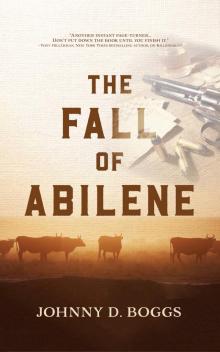 The Fall of Abilene
The Fall of Abilene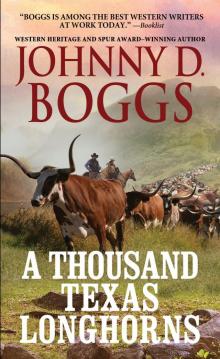 A Thousand Texas Longhorns
A Thousand Texas Longhorns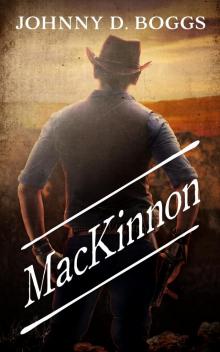 MacKinnon
MacKinnon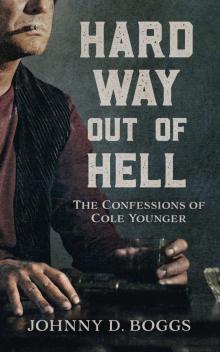 Hard Way Out of Hell
Hard Way Out of Hell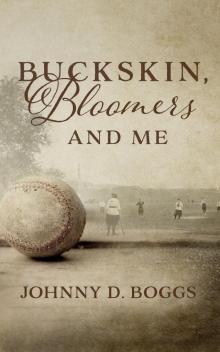 Buckskin, Bloomers, and Me
Buckskin, Bloomers, and Me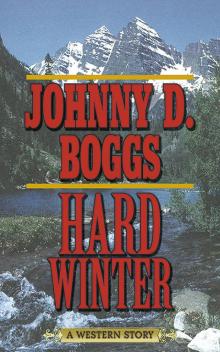 Hard Winter
Hard Winter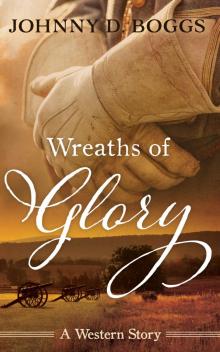 Wreaths of Glory
Wreaths of Glory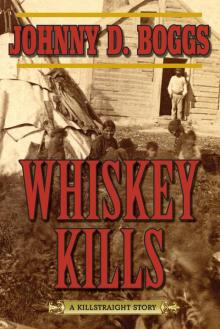 Whiskey Kills
Whiskey Kills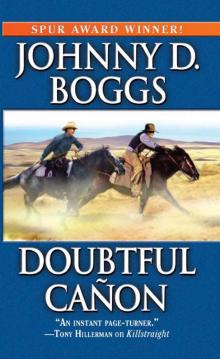 Doubtful Canon
Doubtful Canon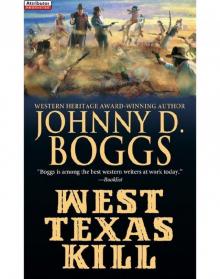 West Texas Kill
West Texas Kill The Killing Shot
The Killing Shot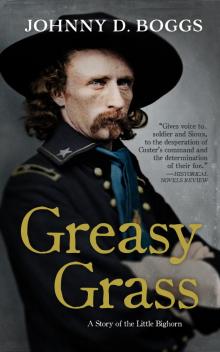 Greasy Grass
Greasy Grass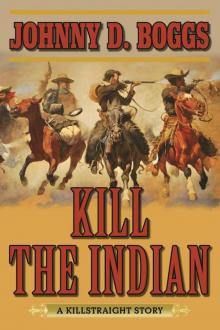 Kill the Indian
Kill the Indian Return to Red River
Return to Red River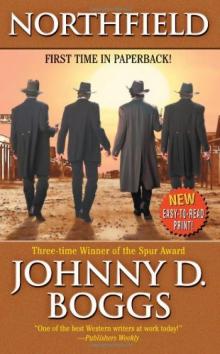 Northfield
Northfield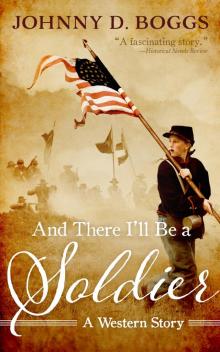 And There I’ll Be a Soldier
And There I’ll Be a Soldier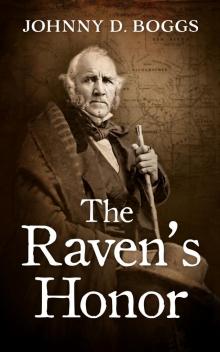 The Raven's Honor
The Raven's Honor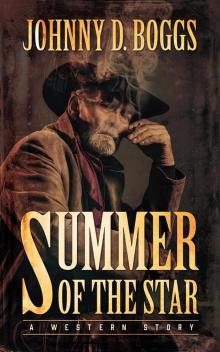 Summer of the Star
Summer of the Star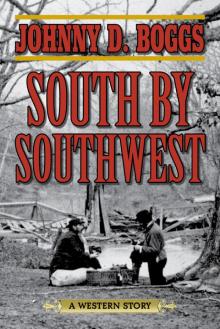 South by Southwest
South by Southwest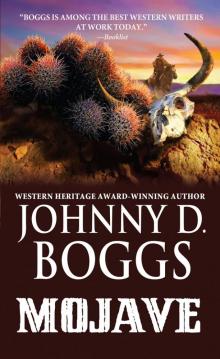 Mojave
Mojave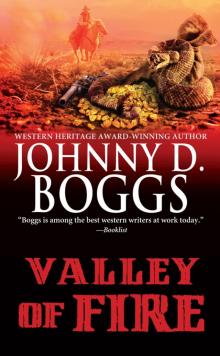 Valley of Fire
Valley of Fire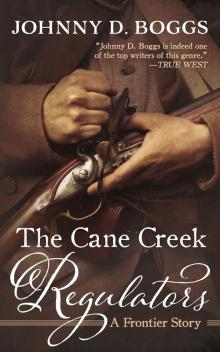 The Cane Creek Regulators
The Cane Creek Regulators